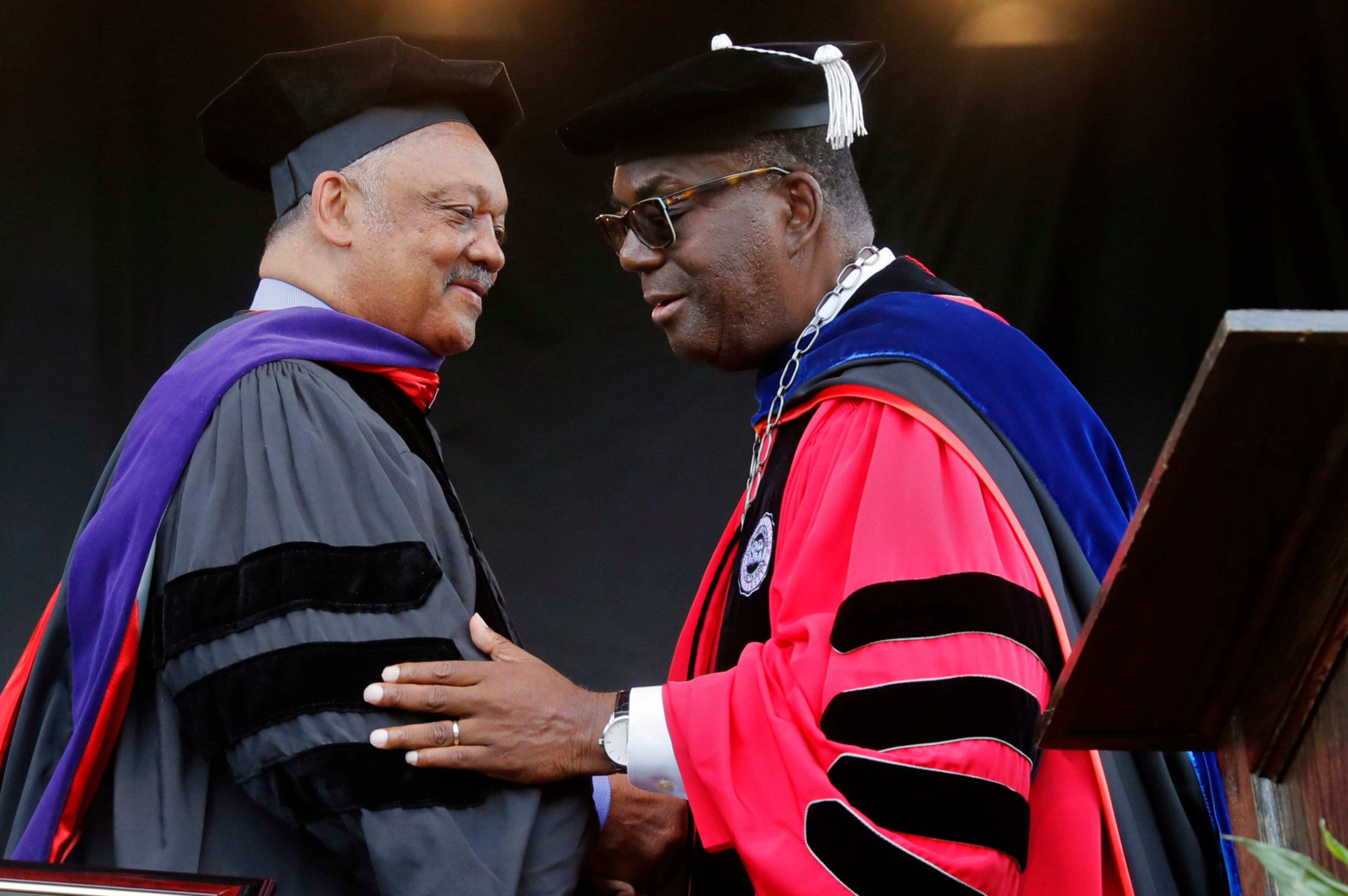Students protest, but wonder if schools hear them
A month after North Springs Charter High School students staged a sit-in to bring awareness of perceived injustices against black people by police, senior Ananda Armstrong said she questions whether administrators got the message.
“I feel like they took it more as a joke,” she said last week. “Like ‘Oh, we let them have their moment, now let’s go about our business.’ “
As students begin conversations on police brutality, racial tensions, and even the presidential election, school districts are struggling to define their role in letting those discussions happen. School districts say they provide a space for students to express themselves, but recently Cobb County’s superintendent said athletes would be benched for taking a knee during the national anthem and Fulton County apparently suspended a teacher for participating in that North Springs High sit-in.
Change won’t happen overnight, said former U.S. Ambassador Andrew Young, who was a young voice in the civil rights movement. It takes time — and a well-developed plan of action. The civil rights movement, he said, was full of strategic planning that had come from decades of research.
“The reason none of us was ever convicted of a felony is we took the time to think through what we were doing,” he said of protests in the 1950s and 1960s. “The lawyers didn’t tell us what to do, but they told us how to do it in such a way we could be defended. A lot of times, people are doing things because they’re angry and frustrated. Well, they already lost.
“My father told me from 4 years old never to get emotional and angry in a fight. You lose the fight.”
The sit-in at North Springs Charter High School was prompted by alleged incidents where a student was told to remove a Black Lives Matter shirt she was wearing, after an administrator called the group a terrorist organization. Students also were protesting injustices across the country. That week, black men were killed in officer-involved shootings in Tulsa, Okla., and Charlotte, N.C.
The same week, a third of the student body — about 850 students — at Archer High School in Lawrenceville staged a sick-out, saying administrators reacted slowly to racist comments some students made on social media. Students there say nothing has come from their action, either.
In her ninth-grade English class, Cross Keys High School teacher Rebekah Morris has created a space to discuss everything from Black Lives Matter and immigration reform to “Of Mice and Men” and “Romeo and Juliet.”
“I try to leave it open for them to add their perspectives,” she said recently. “They don’t really know how to proceed from ‘What do we do?’ They feel very much like they don’t know how to address these issues. But they want to.”
At Cross Keys, many of the students are either first-generation Americans or came to the country after birth. The immigration rights conversation matters as much to them as understanding narrative writing, Morris said.
“They feel like there’s no good relationship with the police along Buford Highway,” she said “A lot of people here are undocumented and feel like they can’t report crimes for fear of deportation. And if the perpetrator might be undocumented, they don’t want to report it for fear that person would get deported.”
Morris, who is white, said she’s been tackling many of the Black Lives Matter conversations with a co-teacher, who is black. Their interaction and ability to tackle the subject together give the students better context, she said.
Retired Cobb County principal Zinta Perkins recalled speaking with her staff after Barack Obama’s election. As he became the first black president, she said, she wanted to help her staff use the moment in their classrooms while not stepping on toes at home.
“I had to help them know how to talk to kids who may have different points of views or feelings,” she said. “It was important to keep the kids focused on the fact that at school, our role is to learn about government … and understand the political climate.
“But when (students) form their own personal beliefs, they have to do that with the guidance of their parents.”
Last month, Cobb County Superintendent Chris Ragsdale told a group of school leaders during a meeting at Kennesaw State University that if a student athlete wanted to take a knee during the national anthem, he’d “bench their asses,” according to several school principals who were at the meeting.
District officials declined to elaborate on Ragsdale’s comments from that meeting, but sent a statement from him saying students would not be disciplined for nondisruptive expression, and specifically mentioning there would be no consequences for kneeling during the national anthem.
Fulton and DeKalb counties have released similar statements, saying students, so long as they’re not being disruptive, are free to exercise their First Amendment rights. DeKalb County Superintendent Steve Green went a step further, sending a note to parents saying conversations on police-involved shootings and other events are being folded into some class instruction.
Fulton County Superintendent Jeff Rose said teachers should be taking advantage of the tough conversations to spur conversations in their classrooms.
“If there’s an opportunity in schools to use this complex, confusing, frustrating time in our country’s history to embrace it so students can learn from it, I think that’s important for us to do,” Rose said recently. “If I were a teacher, my question would be how do I create discourse in my classroom that’s productive? The kind of discourse we want our entire country to be having.
“Do I have the answer? I’m just as confused as the next person.”



